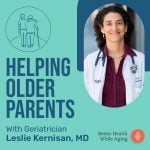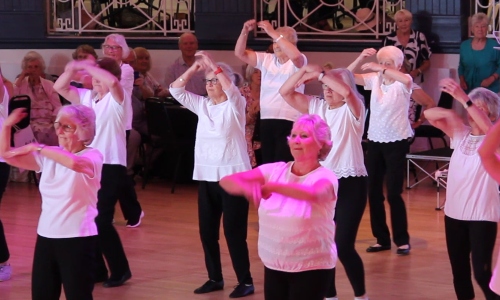(This article is a special guest post by geriatrician Dr. Nicole Didyk, founder of the blog and YouTube channel The Wrinkle. Like me, Dr. Didyk has a particular interest in informing and empowering older adults and families. So I’ve been very glad to have her contributing to the site, and I appreciate her covering some topics that I haven’t had the time to address. Enjoy! — L. Kernisan)

Quick! Think about older adults and sex. What comes to mind? George Burns cracking wise about sex after 90 being like trying to shoot pool with a rope? A sweet old couple holding hands in their rocking chairs? Nothing?
The truth is that what pops into people’s minds, when it comes to older adults and sexuality, is often negative. For instance, it’s common for older adults to be thought of as:
- “Cute” in a chaste and childlike way,
- Predatory and/or “lecherous”, as in the “cougar” or the “dirty old man”, or
- Problematic (think sexual behavior when someone has dementia, or sex between nursing home residents).
This, of course, is largely due to pervasive ageism in society. Sexuality, sexual expression, and the urge for physical intimacy is actually an important part of every adult person’s life.
So it’s sad that it’s so common for it to be treated as “inappropriate” or otherwise discouraged in later life. But fortunately, we’re starting to see significant progress in combatting this aspect of ageism, too.
In my job as a consultant Geriatrician, I see older adults about a wide range of issues, including memory changes, falls, pain, depression, and medication adjustment. But what is often affected by all of those medical issues – yet rarely talked about — is sex.
Geriatrics is a team sport, and one of the professionals on my team is Natalie Wilton, MSW, RSW, a social worker who specializes in working with older adults with dementia. I noticed that Natalie had a particularly skillful approach when working with responsive behaviours in dementia that had a sexual component, and I soon learned that Natalie is also a qualified sex therapist, with a special interest in older adults. I knew I had to interview her for my website, The Wrinkle. One conversation turned into three, and the response from my audience has been remarkable (“Sex and Seniors Part One” is my most viewed video on YouTube!).
Natalie is passionate about this topic because, she says: “Sexuality is a part of our persona throughout the lifespan, and so the perception that older people are asexual is usually not true.” Despite this, she goes on to report that sex is not really talked about in Geriatrics, even in therapeutic settings: “Sex never comes up.” A survey published in the Journal of Clinical Gerontology and Geriatrics indicates that about 58% of geriatricians occasionally ask about sexual function in their patients, and the rest never do. Compare that to the finding that 20 to 30% of those over 80 are sexually active, and this leaves a gap in the comprehensive care of older adults.
Clearly, more needs to be done to help ensure that older adults are supported in addressing this vital dimension of the human experience, and in getting the help they might need from their health providers.
So in this article, I’ll be sharing some of the key things to know about sex in later life and I’ll cover the natural changes in sexual function and behaviour with aging, reveal some surprising truths, and offer some tips for taking care of this important part of living well.
How Aging Changes Sex in Later Life
Most people believe that it’s natural for a person’s sex life to go into decline with advancing age.
Now, it’s true that over time aging, does tend to change the way the body and mind function, and this definitely can affect sexuality.
This doesn’t mean that sex has to be “over” at a certain point or age. But it does mean that certain adaptations often need to be considered, to accommodate one’s changing body and needs.
Let’s look at the normal age-related changes that affect the sex lives of women and men.
“Among men, sex sometimes results in intimacy; among women, intimacy sometimes results in sex.” – Barbara Cartland
How sex changes for older women
There’s no doubt that female sexual function changes with aging, with a decline in sexual activity from 40% in women ages 65-74 to less than 20% in those 75-85. Many older women define sex as vaginal intercourse, which may amplify the decline in sexual activity if a male partner is less healthy or available. The healthier the woman, the more likely she is to engage in sexual activity and although sexual desire may flag, the desire for intimacy does not.
What changes:
After menopause, the lack of estrogen production in females cause changes to the sexual organs, which can lead to challenges:
- Vulva and vaginal wall thinning and shrinkage (also known as “vulvovaginal atrophy”)
- Less lubrication of the vagina and associated tissues
- Increased sensitivity
- Longer arousal time needed
As a result, for women:
- Sexual intercourse can be painful
- Touch can be irritating or painful
- It often takes longer to be ready for sex
- Orgasm may be delayed
What to do:
For women who are experiencing either decreased libido or discomfort during sex, it’s important to bring these up to a medical provider, in order to be checked for common health conditions that might be causing or aggravating these issues.
In general, using lubricants will help reduce discomfort. Many women also find that using some form of topical estrogen in the vagina can help quite a lot.
And, it’s almost always a good idea to incorporate (or revisit) one of the “Three T” foundational intimacy strategies, as they are great for helping with these common age-related changes affecting sexuality:
- More Touch
- More Time
- More Talking
When it comes to timing, Natalie Wilton says: “A lot of older women say their mind feels turned on, but their body’s not quite there yet, ” and that with a prolonged arousal cycle, it can take up to 24 hours of “foreplay” to get physically ready.
This may not mean 24 hours of physical stimulation, but a longer period of romance, intimacy, and closeness may be what’s needed for a satisfying encounter. The foreplay can include talking, but “More Talking” also refers to communicating with one’s partner about what is needed to make sex more comfortable. This might include shopping for a sex toy (online may be preferable to a brick and mortar shop) and lubricant (readily available at most drug stores).
For many women, medication can help, such as topical estrogen therapy (available as a cream, a vaginal suppository, or a ring-shaped insert). Another option may be systemic (oral or patch) hormone replacement therapy; this is usually only prescribed if there are other symptoms of menopause such as hot flashes, due to risks and side effects.
Last but not least, it’s important for women and their partners to be aware of the role of mental states and relationship states, when it comes to a woman’s sexuality. Sex, after all, involves the mind along with the body.
“The most important sexual organ is the brain,” says Natalie Wilton. Relationship status is one of the biggest influences on sexual desire and activity on older females, and with age-related health changes in their partner, Wilton says, “It becomes thinking about sex in a different way and doing things differently”.
For many women, that means adjusting the perception that vaginal intercourse is the only way to have sex, trying different sexual activities, and maybe even using toys or devices to have pleasurable moments with their partner.
How sex changes for older men
With aging, men appear to retain desire and interest longer than women, with up to 70% of those over 70 reporting sexual activity, with “real sex” largely defined as penetrative penis-vagina intercourse.
What changes:
Like in women, the aging male can take longer to become aroused, and can have a longer refractory period after an orgasm before being ready to begin a new sexual cycle. Erectile dysfunction is more common in older age, with up to two-thirds of men over 70 reporting ED.
This can be related to declining testosterone levels, and is also commonly influenced by many age-related conditions and the medications used to treat them.
What to do:
Since medications are such a common cause or contributor to sexual difficulties, it’s a good idea to ask your health provider if medications might be affecting your sex life.
Here’s a list of the most common medications to be aware of, when it comes to erectile dysfunction, organized by condition for which they are prescribed:
- High blood pressure medications: Thiazide diuretics, beta-blockers, spironolactone
- Pain medications: Opiates (e.g. Morphine, Hydromorphone)
- Enlarged prostate medications: 5 alpha-reductase inhibitors (e.g. finasteride)
- Prostate cancer medications: Anti-androgens and other “testosterone blockers”
- Stomach ulcer medications: Histamine-2 blockers (e.g. ranitidine)
- Depression, Anxiety and other mood medications: Tricyclic antidepressants, selective serotonin reuptake inhibitors, benzodiazepines, antipsychotics, phenytoin
- Atrial fibrillation medications: Digoxin
Erectile dysfunction can now often be treated with medications such as sildenafil (brand name Viagra), but it’s best to first get a comprehensive medical evaluation, to identify any health or psychological conditions that are contributing to the ED.
Along with medication adjustments and treatment of other physical health conditions, it also often helps for older men to rethink their approach to sex and intimacy.
For instance, when aging or health problems cause physical changes that are difficult to reverse, a constructive approach is to reframe sex, in order to focus more on sexual activities that don’t require an erection or an ejaculation. Intimacy is important to older men, who are more likely than their mature female counterparts to be in a partnered relationship.
Says Natalie Wilton: “Many things about sex are the same, despite being at an older age, especially the emotional ones”. To keep the connection strong, older adults may need to explore new techniques and devices to maintain a satisfying sex life. These could include toys, lubricants, visual material, or even a trip to the sex therapist.
Keeping sex safe
Preventing pregnancy is usually not a concern in later life. Still, it’s important to use condoms and otherwise practice safe sex, if your partner is new or if you aren’t sure the relationship is exclusive.
That’s because sexually transmitted diseases (STDs) can and do happen to older adults. It’s less likely that an older person will have an STD compared to a younger person, but the risk is still there. In fact, the Centres for Disease Control recommend screening older women for STDs in the following situations:
- New partner
- More than one sex partner
- Sex partner with concurrent partners
- Sex partner with an STD
For more on STDs in later life, see this Harvard Health Letter article: Sexually transmitted disease? At my age?
Beyond Normal Aging: Sex & Disability
Some physical changes are normal and universal, but what about when there are unexpected health challenges in later life that can put a damper on sex? In this section, we’ll talk about ways to work around conditions that can be a part of old age, instead of closing the door to a satisfying sex life.
Learn more about sex and caring for someone with a disability or illness here, in Part Two – Sex and The Caregiver.
Why bother?
Why even have sex if you’re living with disability or illness? Well, it’s good for your physical and emotional health. For instance:
- Sex can cause the release of good brain chemicals like norepinephrine, serotonin, oxytocin, vasopressin, nitric oxide (NO), the hormone prolactin, and even endocannabinoid (your body’s cannabis chemical).
- It boosts self-esteem
- It promotes intimacy and closeness
- It helps to maintain the health of your sexual organs
- Caregivers who have a satisfying sex life are happier than those who don’t
Strategies to help with common health challenges
Pain:
There are many conditions with pain as a symptom, including osteoarthritis, previous injuries, neuropathic pain, or some stroke syndromes. Many pain syndromes are more active in the morning or nighttime – typical times for sexual activity, so making time for sex and intimacy in the middle of the day could be more enjoyable.
Positioning is very important when living with pain, and Natalie Wilton recommends rearranging pillows or looking into purchasing specialized foam wedges that can make sex more comfortable.
Cancer:
Depending on the type of cancer and treatment plan, sex can change dramatically after a cancer diagnosis. Sex may not be able to continue in the physical way that was previously enjoyed and sexual pleasure sensations and orgasm may be very different. Some people lose interest in sex while being treated for cancer, but most want to continue or resume some type of sexual activity, especially if they are in a partnered relationship.
Many cancer centres have a social worker that can help address the communication strategies needed to renegotiate lovemaking in the setting of loss, or loss of function of a body part due to cancer. In practical terms, erectile function can be aided with medication and/or mechanical devices (like a vacuum or suction device).
Heart disease:
Like with cancer treatment, there can be a fear of having sex after a heart attack or major cardiac procedure or surgery. In general, when a person is fit for exercise, they are also fit for vigorous sexual activity, so there may need to be an exploration of activities like massage, cuddling, or sharing sexual fantasies while recovering from a heart attack or surgery.
Many cardiac medications can affect the ability to get an erection for men, and to achieve orgasm in both men and women, but stopping medications due to these side effects can lead to more symptoms and higher risk of recurrent events.
Parkinson’s disease:
Symptoms of Parkinson’s can include stiffness, slowing, and trouble with the autonomic nervous system, which is involved in erections and orgasm. Many treatments for Parkinson’s have a predictable pattern of effect, so scheduling sex when the meds are likely to be at their peak performance can be critical.
Depression:
A mood disorder, or the medications used to treat one, can affect libido and sexual function. Serotonin reuptake inhibitors for example (a commonly prescribed antidepressant) can lead to delayed arousal and difficulty achieving orgasm.
Dementia:
I cover this in more depth in this follow-up article, but sex with a changing brain is something that is often framed as a problem, or “inappropriate”, which can lead to unnecessary medication use or social isolation for the person with dementia. The World Health Organization recognizes the right to sexual expression for all persons if it’s safe and respectful, and that can happen even in the context of dementia, says Natalie Wilton.
Learn more here: Sex When Caregiving: Navigating Your Changing Relationship (Even if There’s Dementia)
You can see from the above points, that sex and health issues are common, and can be addressed in different ways. “For many couples, taking sexual intercourse off the table can be a place to start”, offers Wilton. Shifting the focus from penis-vagina contact and orgasm to intimacy, pleasure and emotional closeness, can take the pressure off and reinforce the connection between partners.
When to talk to a sex therapist
Sex therapists are professionals with additional training in sex therapy and may come from a background of social work, psychology, nursing, or medicine. Most offer counselling and advice and work with individuals or couples. Therapy involves:
- Exploring root causes of difficulty
- Education about practical strategies (e.g. positioning, use of aids)
- Cognitive behavioural techniques to change thoughts and behaviours
Sex therapists almost never provide sex surrogacy or have sexual contact with the client, although those services may be available from other professionals.
Some therapists, like Natalie Wilton, specialize in working with older adults, but many of the issues that come up are the same no matter the age group and can include:
- Mismatch between partners’ levels of interest
- Recovery from infidelity
- Chronic pain affecting sex
- Managing the sexual side of a caregiving relationship and maintaining both partners’ satisfaction
- Female sexual health issues: pain during sex, difficulties with desire or orgasm
- Male sexual health issues: delayed or premature ejaculation, erectile dysfunction
- Returning to sexual activity after an illness or injury
The Bottom Line
Here are the key take-aways that I want every older person (and health provider!) to know:
- Sexual activity is normal and important throughout the lifespan
- Normal aging causes changes in males and females which can affect sexual function and interest
- Common health issues in older adults can also affect sexual desire and performance
- Sexuality in late life may involve reframing goals and preferences to prioritize activities other than penetration and orgasm
- Sex therapy, medication review, and communication with one’s partner are strategies to improve sexual health in older adults
If you’ve been dissatisfied with your sex life or were thinking that “I’m too old for this,” I hope this information will inspire you to take action and tap into the potential of your late-life sexual self.
I’d also be delighted to have you come visit my site The Wrinkle, where you can listen to my interviews with geriatric sex therapist Natalie Wilton; I even have downloadable transcripts for those who want them. Here are the links:
Part One – Sex in Later Life – Interview with Natalie Wilton
Part Two – Sex and the Caregiver with Natalie Wilton
Part Three – Sex and the Changing Brain with Natalie Wilton
And of course, if you have any questions or comments, please post them below!
(There’s nothing to be embarrassed about and…you can of course post as “Anonymous” if you prefer. Because there’s nothing wrong with wanting a little privacy too.)
This article was last reviewed and updated in February 2025.




